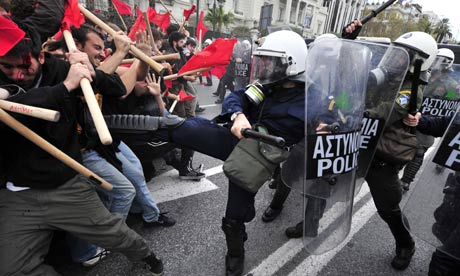Giorgos Kaminis says image of Greek capital is 'deplorable' and a far cry from the orderly city that staged the Olympics in 2004.
Helena Smith in Athens guardian.co.uk, Wednesday 3 August 2011 22.00 BST
Athens violence: Students clash with riot police during a protest over austerity measures. Photograph: Aris Messinis/AFP/Getty Images
Not far from the faceless building that houses Athens city hall, a banner flaps in the wind. For those driving up Sofokleous street, it is difficult to miss. "No to drugs and prostitution", the hand-painted sheet proclaims. "No more tolerance".
Shopkeepers say the banner was erected before Giorgos Kaminis, the city's soft-spoken mayor, took up the post in January. But it is hard not to see that, since then, the vices have got worse: a little further up the road Somalian prostitutes proposition pedestrians at all hours; a little further down, past beggars who cry "I'm hungry", young men crouch in doorways doubled over with needles in hand.
"Where to begin?" asks Kaminis, sitting back in a low leather chair in his sparse sixth-floor office. "There is a flagrant lack of respect for the law, be it prostitution, human trafficking, drug dealing or organised crime. Some 7,000 addicts are on waiting lists for hospital care. Around Patission [a central avenue] there are areas that are so lawless you cannot even go after 6pm."
Kaminis would know. Unlike his conservative predecessors, who ran affairs from a decorative building in the heart of the capital, the French-trained lawyer has set up office in the drab surroundings of an Orwellian behemoth, built to house the municipality's administration in the 1960s. The view from his desk is not of the Acropolis but a cluster of antennae-covered concrete roofs.
In the thick of it, the 57-year-old has a bird's eye view of the toxic mix bedevilling Europe's oldest capital – a reflection, he claims, as much of the country's economic crisis as "years and years" of inadequate policing and other policies.
"The image of Athens is deplorable," he says, admitting that it is a far cry from the orderly city that staged a majestic Olympic Games in 2004.
"The situation is very serious … the municipality is very close to bankruptcy even if its [economic situation] is slightly better than that of the country," he adds. "Our revenues are down by about 20% and that's because our money comes from two sources, taxes included in electricity bills which have dropped with the closure of enterprises and shops, and subventions from the state."
The mayor's task is not helped by the fact that in many ways the Greek capital is also a mirror image of the country's turbulent modern history.
Once the size of a village, whose citizens lived mostly around the foot of the Acropolis in the early 19th century, it now houses half of Greece's 11 million-strong population – testimony to the waves of Greek refugees who, fleeing turmoil, have sought refuge and fortune in the capital.
But with joblessness at an all time high, Athenians, increasingly, are choosing to vote with their feet. "Athens is becoming a city of older people," bemoaned Kaminis, who, like most government ministers, works 14-hour days. "For the third time in 60 years there is a movement of young people going abroad to find jobs. People who are between 20 and 30, graduates with good degrees who would like to stay, are leaving. The country is losing its best minds."
A mass influx of often desperate refugees has exacerbated Athens' descent into lawlessness. And, more worryingly for Kaminis, who was elected to the post as an independent with the backing of greens and leftists including the governing socialists, it has also unleashed fear.
Following the fatal stabbing of a 44-year-old Greek, targeted for his video camera as he prepared to take his pregnant wife to hospital to give birth, far-right vigilantes have retaliated. Self-styled neo-Nazis have grabbed immigrants from buses and beaten them up prompting ministers to speak of the emergence of a Ku Klux Klan.
But while the mayor concedes that he does not always "feel safe" – "nine hotels shut down around Omonia Square this year" – he sees the crisis as a "great opportunity". Athens may appear scruffier than ever, but it is also pulsating with a raw energy that has given birth to a renaissance in the arts and a new civic spirit.
For the first time, Greeks are taking fate into their own hands – forming activist groups to clean up the city with visible result.
"Everything is at red," says Kaminis, who has spent most of his time overseeing cutbacks – "there are no more cell phones for employees or cars for vice mayors" – and weeding out corrupt officials from city hall. "But I am also optimistic. This crisis is the biggest opportunity [to change things]. If we don't make it now, we never will."
Athens mayor tells of crime and violence in Europe's oldest city | World news | The Guardian
![The [Greek] European Tragedy](https://blogger.googleusercontent.com/img/b/R29vZ2xl/AVvXsEiWKI5s90SFm1wWTk6bs4p7CgslaC2SnYPsrZhb-B-smOufNNCSxCvpBLI9hOB-LsXZjir_PNmEiMk2-E62F3xkg96IoC6QFAaZAnPRTVH340IN9WBRmWJqPkjWlgyRj3zpALp7h6hvA58/s920/GkBack_new.jpg)

